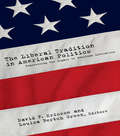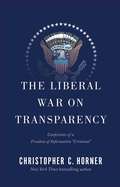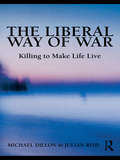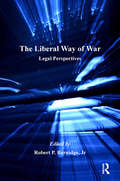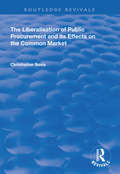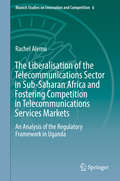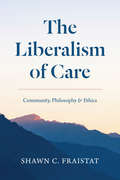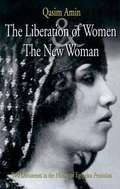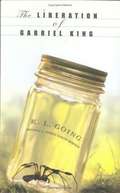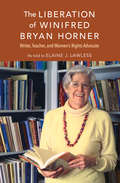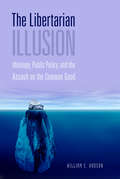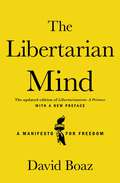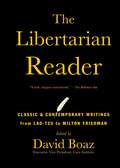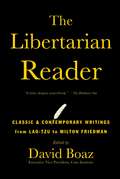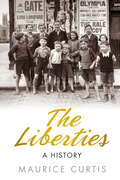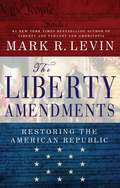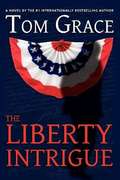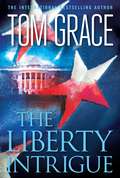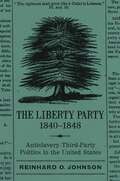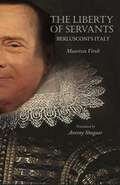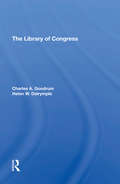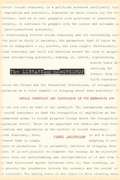- Table View
- List View
The Liberal Tradition in American Politics: Reassessing the Legacy of American Liberalism
by David F. Ericson Louisa Bertch GreenFirst Published in 1999. Routledge is an imprint of Taylor & Francis, an informa company.
The Liberal War on Transparency
by Christopher C HornerLIBERALS ARE HIDING THE TRUTH FROM YOU. WHAT ARE YOU GOING TO DO ABOUT IT, AMERICA? Hailed by Glenn Beck as a "watchdog" and by Rush Limbaugh as a "go-to guy," bestselling author and attorney Christopher C. Horner is a leader in the fight against liberal tyranny in America--with his requests for information even declared "criminal" by the Obama administration. Revealing explosive new information obtained through the Freedom of Information Act and well-placed sources, Horner exposes the tightly kept secret of liberals running our government and schools: a carefully managed war to undermine the taxpayers' right to see what their government is up to. WHAT IS THE OBAMA ADMINISTRATION HIDING? During his campaign, Barack Obama promised "the most transparent administration in history." Not only has this proven to be an empty promise, but he and his liberal allies systematically hide their activities from the public. They use private email accounts and computers, avoid creating records, stonewall information requests, and otherwise delay or deny access to information every taxpayer has a right to know. This eye-opening book exposes the White House tricks, tactics, and "tradecraft" now regularly used to keep Americans in the dark. You'll learn: * Scandalous examples of activist government employee tricks to hide their activities. * How the Obama administration, which leaks sensitive information for political gain (while aggressively prosecuting whistleblowers), deliberately politicized the FOIA process to stonewall legitimate requests for public information. * What the Democrats tried to hide about their crony deals with big business, Solyndra, various liberal initiatives, and UN schemes. * How American colleges and universities bow to radical liberal faculties to hide public records. * How to fight these tactics and make your own FOIA requests to get the information you need--even when the government tries to stop you. This is more than an exposé on the latest Washington cover-up. It is a wake-up call and how-to manual for all Americans to demand transparency from our leaders and defeat the liberal attack on open and honest debate. If you believe in America, you need to fight for your freedoms. You need to take a stand against the Liberal War on Transparency.
The Liberal Way of War: Killing to Make Life Live
by Julian Reid Michael DillonThe liberal way of war and the liberal way of rule are correlated; this book traces that correlation to liberalism's original commitment to 'making life live'. Committed to making life live, liberalism is committed to waging war on behalf of life, specifically to promote the biopolitical life of species being; what the book calls 'the biohuman'. Tracking the advent of the age of life-as-information - complex, adaptive and emergent - while contrasting biopolitics with geopolitics, the book details how and why the liberal way of rule wages war on the human in the cause of instituting the biohuman. Contingent and emergent, the biohuman is however continuously also becoming-dangerous to itself. It therefore requires constant surveillance to anticipate the threats it presents to its own flourishing. The book explains how, in making life live, liberal rule finds its expression, today, in making the biohuman live the emergency of its emergence. Thus does liberal peace become the continuation of war by other means. Just as the information and molecular revolutions have combined to transform liberal military-strategic thinking so also has it contributed to the discourse of global danger through which global liberal governance currently legitimates the liberal way of war.
The Liberal Way of War: Legal Perspectives
by Jr Robert P. BarnidgeExamining some of the huge challenges that liberal States faced in the decade after 11 September 2001, the chapters in this book address three aspects of the impact of more than a decade of military action.This book begins by considering four different expressions of universalist moral aspirations, including the prohibition of torture, and discusses migration and ’responsibility to protect,’ as well as the United Nations Human Rights Committee's Concluding Observations about security and liberty in the last decade. International humanitarian law and the problems posed by the territorial character of war and the effects of new technologies and child soldiers are also analysed. Finally, Islamic law and its interface with international law is considered from a new perspective, and contributions in this final part offer a different way of thinking about an authentically Islamic modernisation that would be compatible with Western models of political order. With contributions from international lawyers from diverse backgrounds, this book fills an important gap in the literature on the themes of international human rights law, international humanitarian law and Islamic law.
The Liberalisation of Public Procurement and its Effects on the Common Market (Routledge Revivals)
by Christopher BovisFirst published in 1998, Public Procurement in the European Community has been considered as the most-important non-tariff barrier for the completion of the common market and its liberalisation reflects the attempts of law and policy makers to enhance competitiveness in the public sector and achieve uniform patterns of industrial efficiency. The opening-up of procurement stresses the fact that the Member States must embark upon a process of changing their public sector management ethos and adopt more market-orientated parameters (value for money, efficiency, improved risk management, market testing, outsourcing, private finance, savings) in the delivery of public services, alongside the principles of transparency and public accountability. The book is addressed to academics and researchers in the fields of law, public policy and government studies, legal practitioners, policy makers, government officials as well as industry executives. It provides a multi-disciplinary analysis of public procurement law and policy and assesses its impact on the European integration process. It investigates the implications of the opening-up of the European public markets on other legal and economic systems in the world and analyses the regulation of public purchasing as part of the emerging Economic Law of the European Union.
The Liberalisation of the Telecommunications Sector in Sub-Saharan Africa and Fostering Competition in Telecommunications Services Markets
by Rachel AlemuThis study investigates whether the existing regulatory framework governing the telecommunications sector in countries in Sub-Saharan Africa effectively deals with emerging competition-related concerns in the liberalised sector. Using Uganda as a case study, it analyses the relevant provisions of the law governing competition in the telecommunications sector, and presents three key findings: Firstly, while there is comprehensive legislation on interconnection and spectrum management, inefficient enforcement of the legislation has perpetuated concerns surrounding spectrum scarcity and interconnection. Secondly, the legislative framework governing anti-competitive behaviour, though in line with the established principles of competition law, is not sufficient. Specifically, the framework is not equipped to govern the conduct of multinational telecommunications groups that have a strong presence in the telecommunications sector. Major factors hampering efficient competition regulation include Uganda's sole reliance on sector-specific competition rules, restricted available remedies, and a regulator with limited experience of enforcing competition legislation. The weaknesses in the framework strongly suggest the need to adopt an economy-wide competition law. Lastly, wireless technology is the main means through which the population in Uganda accesses telecommunications services. Greater emphasis should be placed on regulating conduct in the wireless communications markets.
The Liberalism of Care: Community, Philosophy, & Ethics
by Shawn C. FraistatAttention to care in modern society has fallen out of view as an ethos of personal responsibility, free markets, and individualism has taken hold. The Liberalism of Care argues that contemporary liberalism is suffering from a crisis of care, manifest in a decaying sense of collective political responsibility for citizens’ well-being and for the most vulnerable members of our communities. Political scientist Shawn C. Fraistat argues that we have lost the political language of care, which, prior the nineteenth century, was commonly used to express these dimensions of political life. To recover that language, Fraistat turns to three prominent philosophers—Plato, Jean-Jacques Rousseau, and William Godwin—who illuminate the varied ways caring language and caring values have structured core debates in the history of Western political thought about the proper role of government, as well as the rights and responsibilities of citizens. The Liberalism of Care presents a distinctive vision for our liberal politics where political communities and citizens can utilize the ethic and practices of care to face practical challenges.
The Liberation Of Women And The New Woman: Two Documents In The History Of Egyptian Feminism
by Qasim AminQasim Amin (1863-1908), an Egyptian lawyer, is best known for his advocacy of women's emancipation in Egypt, through a number of works including The Liberation of Women and The New Woman. In the first of these important books in 1899, he started from the premise that the liberation of womenwas an essential prerequisite for the liberation of Egyptian society from foreign domination, and used arguments based on Islam to call for an improvement in the status of women. In doing so, he promoted the debate on women in Egypt from a side issue to a major national concern, but he alsosubjected himself to severe criticism from the khedival palace, as well as from religious leaders, journalists, and writers. In response he wrote The New Woman, published in 1900, in which he defended his position and took some of his ideas further. In The New Woman, Amin relies less on arguments based on the Quran and Sayings of the Prophet, and more openly espouses a Western model of development. Although published acentury ago, these two books continue to be a source of controversy and debate in the Arab world and remain key works for understanding the Arab feminist movement. The Liberation of Women and The New Woman appear here in English translation for the first time in one volume.
The Liberation of Gabriel King
by K. L. GoingSet in 1976 Georgia, this is the poignant story of a white boy, who is afraid of everything, and his best friend, who's the only black girl in school, and the summer they learn to face down their fears.
The Liberation of Winifred Bryan Horner: Writer, Teacher, and Women's Rights Advocate
by Elaine J. LawlessThis inspiring tale of grit and determination sprinkled with humor, wit, and a taste of irony is the story of Winifred Bryan Horner’s journey from a life of domesticity on the family farm after World War II to becoming an Endowed Professor. Her compelling story is one of a woman’s fight for equal rights and her ultimate success at a time when women were openly deemed "less than" men in the professional world. Winifred, a professional writer and consummate storyteller known to friends and family as Win, always assumed she would write her own memoir. But after retiring from teaching, she found that she could never find the time or inspiration to sit down and record the pivotal stories of her remarkable 92 years of life. Colleague and mentee Elaine J. Lawless devised a plan to interview Win about her life and allow her to tell stories with the intention that Win would edit the transcriptions into her memoir. Over four months, Elaine visited Win on Wednesdays to interview her about her life. Sadly, just one week after the conclusion of the final interview, Win unexpectedly passed away, before Elaine could give her the final transcripts. With the support of Win’s family, Elaine set out to finish this book on Win’s behalf.Win’s story is one that will inspire and resonate with women as they continue to work toward equality in the world.
The Libertarian Illusion: Ideology, Public Policy and the Assault on the Common Good
by William E. HudsonLooking at public policy debates in conventional terms—in terms of conflict between the left and the right—has grown increasingly cumbersome in an era where conservatives call themselves revolutionaries and liberals strike positively Burkean poses when it comes to reforming Social Security or Medicare. Through an examination of the libertarian worldview, once on the margins of American politics but now in the mainstream, William E. Hudson shows how it has attracted powerful political supporters and is promoted by a network of institutions and policy advocates dedicated to its ideals. The Libertarian Illusion offers a well researched, balanced, and systematic critique of libertarian policy proposals on both the conservative (taxation and fiscal policy, health care, social security, and business regulation) and liberal (abortion, stem cell research, and euthanasia) sides of the traditional political spectrum.Always engaging and provocative, Hudson hones in on the fundamental value differences that drive political debate, arguing that a more communitarian outlook offers solutions more likely to solve America’s policy problems.
The Libertarian Illusion: Ideology, Public Policy, and the Assault on the Common Good
by William E. HudsonThe Libertarian Illusion offers a well researched, balanced, and systematic critique of libertarian policy proposals on both the conservative (taxation and fiscal policy, health care, social security, and business regulation) and liberal (abortion, stem cell research, and euthanasia) sides of the traditional political spectrum.
The Libertarian Mind: A Manifesto for Freedom
by David BoazAn updated edition of David Boaz&’s timeless primer on libertarianism, with a new preface by the author. Libertarianism—the philosophy of personal and economic freedom—has deep roots in Western civilization and in American history, with increasing appeal to those dissatisfied with the status quo. The growth of executive power, chronic deficits, counterproductive foreign military interventions, protectionist trade measures, a costly drug war, and many other threats to civil liberties have pushed millions of Americans in a libertarian direction. The Libertarian Mind is a comprehensive guide to the history and philosophy of this movement. This updated edition delves into the principles of libertarianism, exploring its roots and its development over time. It offers a rich collection of ideas that present a compelling case for individual liberty and mutual cooperation. Challenging the notion of top-down governmental control, the book advocates instead for a society built on freedom and individual rights. But The Libertarian Mind is more than just a book; it&’s a manifesto for freedom. It&’s a call to action for those who believe in the sovereignty and fundamental dignity of the individual and the importance of political freedom.
The Libertarian Reader
by David BoazThe first collection of seminal writings on a movement that is rapidly changing the face of American politics, The Libertarian Reader links some of the most fertile minds of our time to a centuries-old commitment to freedom, self-determination, and opposition to intrusive government. A movement that today counts among its supporters Steve Forbes, Nat Hentoff, and P.J. O'Rourke, libertarianism joins a continuous thread of political reason running throughout history. Writing in 1995 about the large numbers of Americans who say they'd welcome a third party, David Broder of The Washington Post commented, "The distinguishing characteristic of these potential independent voters-aside from their disillusionment with Washington politicians of both parties-is their libertarian streak. They are skeptical of the Democrats because they identify them with big government. They are wary of the Republicans because of the growing influence within the GOP of the religious right." In The Libertarian Reader, David Boaz has gathered the writers and works that represent the building blocks of libertarianism. These individuals have spoken out for the basic freedoms that have made possible the flowering of spiritual, moral, and economic life. For all independent thinkers, this unique sourcebook will stand as a classic reference for years to come, and a reminder that libertarianism is one of our oldest and most venerable American traditions.
The Libertarian Reader
by David Boaz"The most magnificent collection of libertarian writings ever published" (Laissez Faire Books).An important collection of seminal writings on a movement that is rapidly changing the face of American politics, The Libertarian Reader links some of the most fertile minds of our time to a centuries-old commitment to freedom, self-determination, and opposition to intrusive government. This is the first comprehensive anthology of libertarian thought--from the Bible and Lao-Tzu to Hayek and Milton Friedman--to be published in one volume. The 68 selections from great libertarian writers are an intellectual feast, covering such key libertarian themes as skepticism about power, individual rights, spontaneous order, free markets, and peace. For all independent thinkers, this unique sourcebook will stand as a classic reference for years to come, and a reminder that libertarianism is one of our oldest and most venerable American traditions.
The Libertarian Reader
by David BoazThe first collection of seminal writings on a movement that is rapidly changing the face of American politics, The Libertarian Reader links some of the most fertile minds of our time to a centuries-old commitment to freedom, self-determination, and opposition to intrusive government. A movement that today counts among its supporters Steve Forbes, Nat Hentoff, and P.J. O'Rourke, libertarianism joins a continuous thread of political reason running throughout history.Writing in 1995 about the large numbers of Americans who say they'd welcome a third party, David Broder of The Washington Post commented, "The distinguishing characteristic of these potential independent voters-aside from their disillusionment with Washington politicians of both parties-is their libertarian streak. They are skeptical of the Democrats because they identify them with big government. They are wary of the Republicans because of the growing influence within the GOP of the religious right."In The Libertarian Reader, David Boaz has gathered the writers and works that represent the building blocks of libertarianism. These individuals have spoken out for the basic freedoms that have made possible the flowering of spiritual, moral, and economic life. For all independent thinkers, this unique sourcebook will stand as a classic reference for years to come, and a reminder that libertarianism is one of our oldest and most venerable American traditions.
The Liberties: A History
by Maurice CurtisFollowing the murder of Thomas á Becket, King Henry II came to Ireland. He decreed that an abbey be founded in his memory, and the monks that founded it were to be free from city taxes and rates. This ‘Liberty’ expanded and took in the part of Dublin which today is known as the Liberties, one of Dublin’s oldest and most interesting parts of the capital, occupying a unique place in Ireland’s social and cultural history. In this book, author Maurice Curtis explores this fascinating history and its significance to the people of Dublin.
The Liberty Amendments: Restoring the American Republic
by Mark R. LevinFor a century, the Statists have steadfastly constructed a federal Leviathan, distorting and evading our constitutional system in pursuit of an all-powerful, ubiquitous central government. The result is an ongoing and growing assault on individual liberty, state sovereignty, and the social compact. Levin argues that if we cherish our American heritage, it is time to embrace a constitutional revival. The delegates to the 1787 Constitutional Convention in Philadelphia and the delegates to each state’s ratification convention foresaw a time when—despite their best efforts to forestall it—the Federal government might breach the Constitution’s limits and begin oppressing the people. Agencies such as the IRS and EPA and programs such as Obamacare demonstrate that the Framers’ fear was prescient. Therefore, the Framers provided two methods for amending the Constitution. The second was intended for our current circumstances—empowering the states to bypass Congress and call a convention for the purpose of amending the Constitution. Levin argues that we, the people, can avoid a perilous outcome by seeking recourse, using the method called for in the Constitution itself. The Framers adopted ten constitutional amendments, called the Bill of Rights, that would preserve individual rights and state authority. Levin lays forth eleven specific prescriptions for restoring our founding principles, ones that are consistent with the Framers’ design. His proposals—such as term limits for members of Congress and Supreme Court justices and limits on federal taxing and spending—are pure common sense, ideas shared by many. They draw on the wisdom of the Founding Fathers—including James Madison, Benjamin Franklin, Thomas Jefferson, and numerous lesser-known but crucially important men—in their content and in the method for applying them to the current state of the nation. Now is the time for the American people to take the first step toward reclaiming what belongs to them. The task is daunting, but it is imperative if we are to be truly free.
The Liberty Intrigue: A Novel
by Tom GraceRoss Egan has quietly labored for years in the West African nation of Dutannuru, a tiny republican democracy that emerged from the wreckage of the brutal civil war that claimed the brilliant engineer's wife and child. When a neighboring despot threatens Dutannuru with renewed violence, Egan is abruptly thrust onto the world stage at the center of the deadly international crisis. His actions and resulting notoriety land him on the short list of individuals capable of challenging the progressive incumbent for the presidency of the United States. A political neophyte, Egan is intrigued by the task of unseating a ruthless political operator seen by some as the most dangerously leftist president in the nation's history. To win the White House, Egan must mount the most unorthodox presidential campaign ever attempted, and navigate through a daunting new world marked by character assassination, high-level corruption, armed raids, and political murder.
The Liberty Intrigue: A Novel
by Tom GraceAmerican billionaire Ross Egan is still living in the West African nation of Dutannuru where his wife and child died years earlier in a brutal civil war. Now a fragile democracy, Dutannuru is thrust into the international spotlight when a neighboring despot threatens violence—and Ross Egan's heroic actions and immediate worldwide fame abruptly land him on the short list of candidates for the United States presidency. <P><P> Despite his reservations, Egan is intrigued by the challenge of unseating the incumbent, a ruthless and radically left-wing political operator. But entering the presidential race may turn out to be the most dangerous decision this war-hardened expat billionaire has ever made...
The Liberty Party, 1840-1848: Antislavery Third-Party Politics in the United States (Antislavery, Abolition, and the Atlantic World)
by Reinhard O. JohnsonIn early 1840, abolitionists founded the Liberty Party as a political outlet for their antislavery beliefs. A mere eight years later, bolstered by the increasing slavery debate and growing sectional conflict, the party had grown to challenge the two mainstream political factions in many areas. In The Liberty Party, 1840--1848, Reinhard O. Johnson provides the first comprehensive history of this short-lived but important third party, detailing how it helped to bring the antislavery movement to the forefront of American politics and became the central institutional vehicle in the fight against the "peculiar institution." As the major instrument of antislavery sentiment, the Liberty organization was more than a political party and included not only eligible voters but also disfranchised African Americans and women. Most party members held evangelical beliefs, and as Johnson relates, an intense religiosity permeated most of the group's activities. At least eight U.S. senators, eighteen members of the House of Representatives, five state governors, and two justices of the Supreme Court were among the many Liberty Party members with distinguished careers in the public and private sectors. Though most early Liberty supporters came from the Whig Party, an increasing number of former Democrats joined the party as it matured. Johnson discusses the Liberty Party's founding and its national growth through the presidential election of 1844; its struggles to define itself amid serious internal disagreements over philosophy, strategy, and tactics in the ensuing years; and the reasons behind its decline and merger into the Free Soil coalition in 1848. Since most Liberty Party activities occurred at the state level, Johnson treats the history of each state party in considerable detail, demonstrating how the party developed differently state by state and illustrating how these differences blended with the national view of the party.Informative appendices include statewide results for all presidential and gubernatorial elections between 1840 and 1848, the Liberty Party's 1844 platform, and short biographies of every Liberty member mentioned in the main text of the book. Epic in scope and encyclopedic in detail, The Liberty Party, 1840--1848 will serve as an invaluable reference for anyone interested in nineteenth-century American politics.
The Liberty of Servants: Berlusconi's Italy
by Maurizio ViroliA compelling look at how a people can be unfree even though they are not oppressedItaly is a country of free political institutions, yet it has become a nation of servile courtesans, with Silvio Berlusconi as their prince. This is the controversial argument that Italian political philosopher and noted Machiavelli biographer Maurizio Viroli puts forward in The Liberty of Servants. Drawing upon the classical republican conception of liberty, Viroli shows that a people can be unfree even though they are not oppressed. This condition of unfreedom arises as a consequence of being subject to the arbitrary or enormous power of men like Berlusconi, who presides over Italy with his control of government and the media, immense wealth, and infamous lack of self-restraint.Challenging our most cherished notions about liberty, Viroli argues that even if a power like Berlusconi's has been established in the most legitimate manner and people are not denied their basic rights, the mere existence of such power makes those subject to it unfree. Most Italians, following the lead of their elites, lack the minimal moral qualities of free people, such as respect for the Constitution, the willingness to obey laws, and the readiness to discharge civic duties. As Viroli demonstrates, they exhibit instead the characteristics of servility, including flattery, blind devotion to powerful men, an inclination to lie, obsession with appearances, imitation, buffoonery, acquiescence, and docility. Accompanying these traits is a marked arrogance that is apparent among not only politicians but also ordinary citizens.
The Library Of Congress
by Charles A Goodrum Helen W DalrympleFrom a review of the first edition: "For those of us whose minds unhinge at the sheer immensity of the Library of Congress, with its maze of corridors, multilayered stacks and circuitous subterranean passages, this study will prevent many a false step."—Smithsonian Since the first edition of this book appeared in 1972, there have been many changes in the Library, including a massive reorganization begun in 1977 under the leadership of Daniel J. Boorstin, the present Librarian of Congress. This completely revised and updated look at the Library brings the story up to date, discussing the Library's history, how it works, how the user can take advantage of its many services, where it is going, and how it meets the wide-ranging needs of Congress, other federal government offices, and the library, scholarly, and creative worlds. The authors emphasize the recent impact of technology on what is the largest information-storage and retrieval "machine" in the world. Lively writing and accessible language make this book an ideal introduction to the Library of Congress for the visitor, the first-time user, or the general reader, but it is also a must for every library and librarian, as well as an excellent textbook for library administration courses. The information it contains will make it of great interest even to the most experienced users of the Library.
The Library and the Workshop
by Jenny AnderssonThis book offers a detailed account of the way that social democracy today makes sense of capitalism. In particular, it challenges the idea that social democracy has gone "neoliberal," arguing that so-called Third Way policies seem to have brought out new aspects of a thoroughgoing social interventionism with roots deep in the history of social democracy. Author Jenny Andersson expertly develops the claim that what distinguishes today's social democracy from the past is the way that it equates cultural and social values with economic values, which in turn places a premium on individuals who are capable of succeeding in the knowledge economy. Offering an insightful study of Britain's New Labour and Sweden's SAP, and of the political cultural transformations that have taken place in those countries, this is the first book that looks seriously into how the economic, social, and cultural policies of contemporary social democracy fit together to form a particular understanding of capitalism and capitalist politics.
The Library of Congress (Know Your Government)
by Andrew L. SimpsonFrom the Book Jacket: THE LIBRARY OF CONGRESS was founded in 1800 to aid members of Congress in the drafting of legislation. From a collection of just 152 books, the Library's holdings, as well as the number of people the Library assists, have increased through the years. Today it is the largest library in the world, with more than 85 million items: Its collections include books, maps, manuscripts, prints, photographs, sound recordings, motion pictures, and musical works. Through the Congressional Research Service and the Law Library, it still provides research assistance to members of Congress. But it also offers a wide variety of services to the public: It loans books and provides cataloging and bibliographic assistance to other libraries, distributes braille and talking books to the blind, and administers the Copyright Office. The Library of Congress also serves as a cultural center by presenting exhibits, concerts, and poetry readings. Today the Library of Congress is actively exploring new technologies, including paper deacidification and optical disk storage, to preserve its collections for future generations. THE KNOW YOUR GOVERNMENT series is an introduction to the history and functions of the various departments and agencies that make up our national government. The series is designed to present an overview that is comprehensive and yet accessible for young readers and others who require a broad, straightforward introduction to the workings of the federal government. Each volume in the series focuses on the history, purpose, and scope of a different government department or agency. The books are generously illustrated and are written by experts in the fields of history, politics, law, and government. The introduction, "Government: Crises of Confidence," by the Pulitzer Prize-winning historian Arthur M. Schlesinger, Jr., places the federal government in historical context and explains the purpose of the series. "Without an understanding of government, we cannot have the informed criticism that makes government do the job right. It is the duty of every American citizen to know our government, which is what this series is all about."
